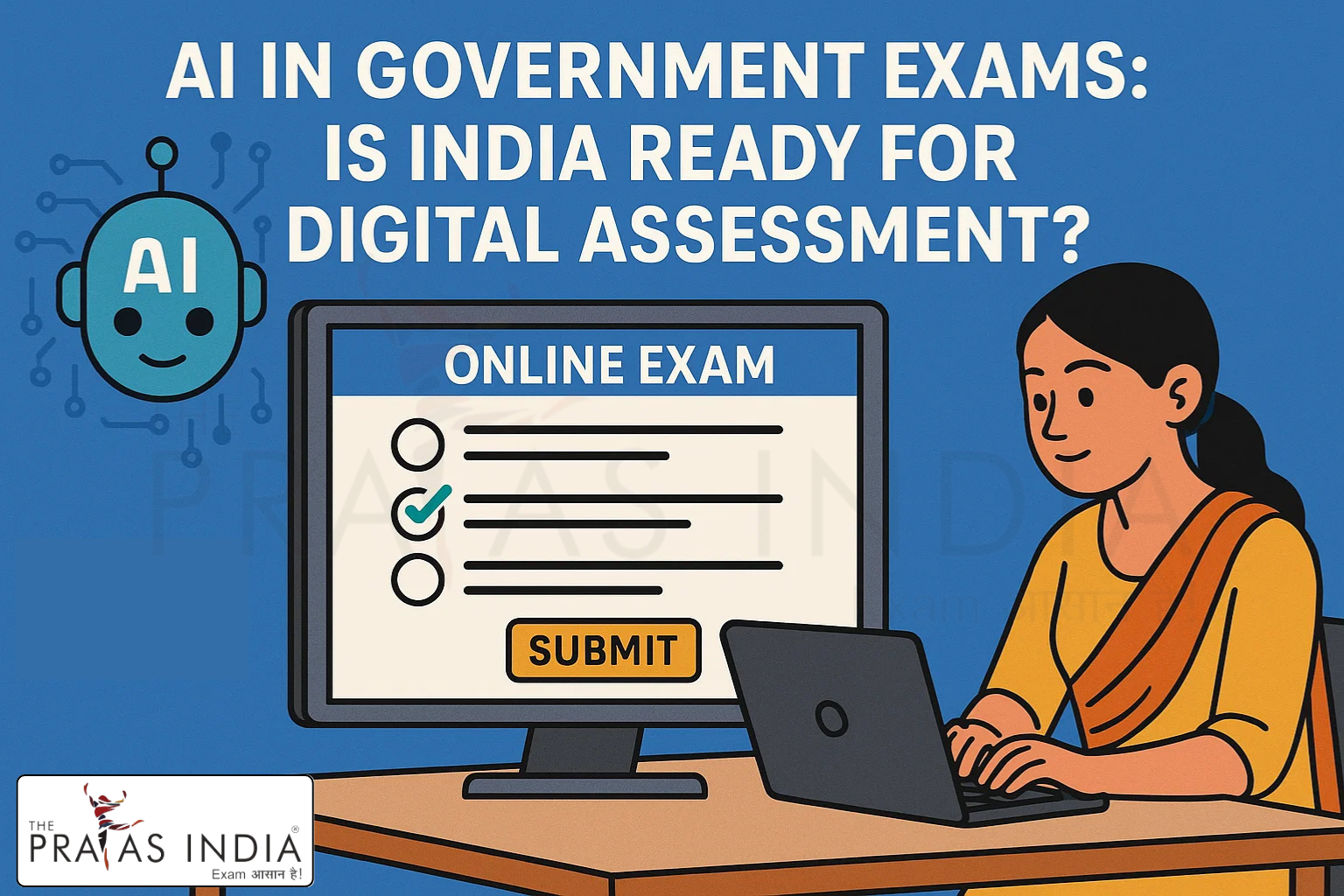AI in Government Exams: Is India Ready for Digital Assessments?
The integration of Artificial Intelligence (AI) in competitive exams has emerged as a transformative trend across global education systems. In India, this trend is slowly but steadily gaining traction as examination authorities explore digital assessments powered by AI. With growing concerns around exam integrity, transparency, and scalability, the National Testing Agency (NTA), state-level boards, and even recruitment bodies are beginning to assess the feasibility of AI-proctored government exams. As of July 2025, this conversation is not just theoretical—it is unfolding in real time.

What is AI-Proctored Assessment?
AI-proctored exams refer to digital tests monitored and analyzed by artificial intelligence systems. These systems track candidate behavior through webcams, microphones, screen activity, and biometric data to ensure that the test is conducted fairly. They can detect suspicious activities such as multiple faces in a frame, background noise, screen sharing, and sudden tab switches.
Why India is Considering AI in Exams
Several reasons are driving the shift toward AI-based assessments in India:
-
Scalability: Conducting exams for millions of students across the country, especially for SSC, IBPS, CUET, and state-level CETs, requires immense logistical effort. AI can streamline and decentralize this process.
-
Integrity: With paper leaks and impersonation scandals surfacing in recent years, AI offers an added layer of security through continuous surveillance and behavior analysis.
-
Cost Efficiency: Digital exams reduce costs linked to printing, logistics, and manual evaluation over time.
-
Speed: AI enables quicker evaluation and result declaration, especially for objective-type exams.
Recent Developments in 2025
In 2025, India has seen several key developments indicating a move toward AI-driven testing:
-
The National Testing Agency is conducting pilot tests with AI-based invigilation for online practice exams.
-
Some state examination boards, such as Maharashtra and Karnataka, are experimenting with hybrid exam models combining in-person and AI-supervised assessments.
-
Private testing companies collaborating with government bodies are offering AI-enabled platforms to reduce manual errors in exam processing.
These advancements indicate a growing institutional confidence in AI as a tool for examination management.
Challenges Ahead
Despite the promising outlook, India faces considerable challenges before AI can be fully integrated into government exams:
-
Digital Divide: Not all students, especially in rural or remote areas, have access to reliable internet, devices, or digital literacy. Implementing online AI-based exams without addressing this divide can lead to inequality.
-
Privacy Concerns: Use of facial recognition, screen recording, and voice monitoring raises questions about data privacy and surveillance.
-
Algorithmic Bias: AI systems may unintentionally discriminate based on race, language, lighting conditions, or facial features—raising ethical concerns.
-
Infrastructure Readiness: Many examination centers across India lack the required digital infrastructure for large-scale online testing.
Implications for Aspirants
Students preparing for government exams need to adapt to the evolving landscape. While traditional pen-paper exams still dominate, it is becoming increasingly important to build familiarity with online platforms, mock tests, and digital tools. Those who prepare early for AI-supervised environments will likely find themselves at an advantage.
Coaching institutes also have a role to play by integrating digital assessment platforms and training aspirants on time-bound online practice tests under simulated exam conditions.
Conclusion
AI in government exams is no longer a futuristic concept; it is an ongoing transformation. While India is not yet fully ready for a nationwide shift to AI-proctored assessments, the direction is clear. With thoughtful policy, infrastructure investment, and ethical considerations, AI could significantly improve the fairness and efficiency of the Indian examination system.
As aspirants and educators adapt to this digital shift, staying informed and tech-ready will be key. The rise of AI in assessments marks a new chapter in India’s journey toward transparent, scalable, and inclusive education.




![Prayas-तेजस [UPSC CSE Sociology Optional] – Online & Offline](https://theprayasindia.com/wp-content/uploads/2025/09/Prayas-तेजस-UPSC-CSE-Optional-Subject-The-Prayas-India-300x300.png)
![Prayas-सूत्र [UPSC CSE Materials (Hardcopy)]](https://theprayasindia.com/wp-content/uploads/2025/09/Prayas-सूत्र-UPSC-CSE-Study-Materials-Hardcopy-The-Prayas-India-300x300.png)
![Prayas-मंत्रा [UPSC CSE CSAT]](https://theprayasindia.com/wp-content/uploads/2025/09/Prayas-मंत्रा-UPSC-CSE-CSAT-The-Prayas-India-300x300.png)
![Prayas सारथी [UPSC CSE One on One Mentorship]](https://theprayasindia.com/wp-content/uploads/2025/09/Prayas-सारथी-UPSC-CSE-One-on-One-Mentorship-The-Prayas-India-300x300.png)










